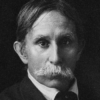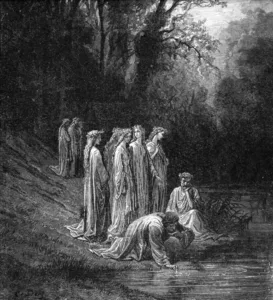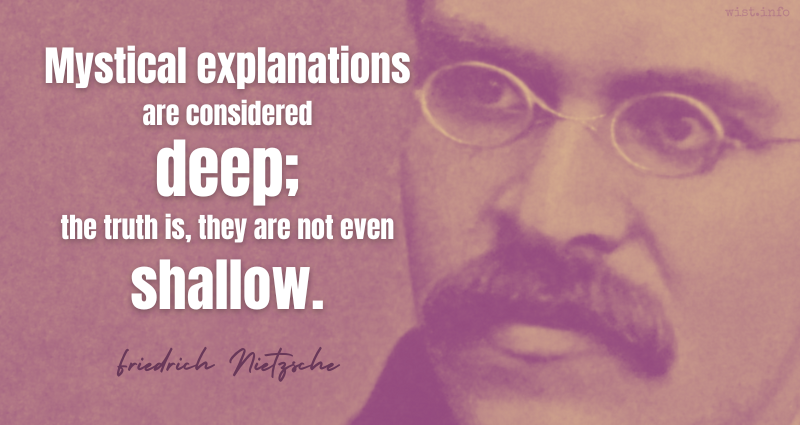If in the following pages I seem to express myself dogmatically, it is only because I find it very boring to qualify every phrase with an ‘I think’ or ‘to my mind.’ Everything I say is merely an Opinion of my own. The reader can take it or leave it. If he has the patience to read what follows he will see that there is only one thing about which I am certain, and this is that there is very little about which one can be certain.
W. Somerset Maugham (1874-1965) English novelist and playwright [William Somerset Maugham]
The Summing Up, ch. 5 (1938)
(Source)
To found the reward for virtuous actions on the approval of others is to choose too uncertain and shaky a foundation. Especially in an age as corrupt and ignorant as this, the good opinion of the people is a dishonor. Whom can you trust to see what is praiseworthy?
[De fonder la recompence des actions vertueuses, sur l’approbation d’autruy, c’est prendre un trop incertain et trouble fondement, signamment en un siecle corrompu et ignorant, comme cettuy cy la bonne estime du peuple est injurieuse. A qui vous fiez vous, de veoir ce qui est louable?]Michel de Montaigne (1533-1592) French essayist
Essays, Book 3, ch. 2 “Of Repentence [Du Repentir]” (1586) (3.2) (1595) [tr. Frame (1943)]
(Source)
This essay first appeared in the 1588 ed. The second sentence/phrase (on the age being so corrupt) and following were added for the 1595 ed.
(Source (French)). Alternate translations:
To ground the recompence of vertuous actions, upon the approbation of others, is to undertake a most uncertaine or troubled foundation, namely in an age so corrupt and times so ignorant, as this is: the vulgar peoples good opinion is injurious. Whom trust you in seeing what is commendable?
[tr. Florio (1603)]
To ground the Recompence of virtuous Actions upon the Approbation of others, is too uncertain and unsafe a Foundation; especially in so corrupt and ignorant an Age as this, the good Opinion of the Vulgar is injurious. Upon whom do you relie to shew you what is recommendable?
[tr. Cotton (1686)]
To ground the recompense of virtuous actions upon the approbation of others is too uncertain and unsafe a foundation, especially in so corrupt and ignorant an age as this, wherein the good opinion of the vulgar is injurious: upon whom do you rely to show you what is recommendable?
[tr. Cotton/Hazlitt (1877)]
To base the reward of virtuous actions on the approbation of others is to choose a too uncertain and obscure foundation. Especially in a corrupt and ignorant age like this, the good opinion of the vulgar is offensive; to whom do you trust to perceive what is praiseworthy?
[tr. Ives (1925)]
Basing the recompense of virtuous deeds on another’s approbation is to accept too uncertain and confused a foundation -- especially since in a corrupt and ignorant period like our own to be in good esteem with the masses is an insult: whom would you trust to recognize what was worthy of praise!
[tr. Screech (1987)]
The knowledge that one has a remedy within reach is often as effectual as the remedy itself, if not more so.
F. Anstey (1856-1934) English novelist and journalist (pseud. of Thomas Anstey Guthrie)
Tourmalin’s Time Cheques, ch. 2 “The Second Cheque” (1885)
(Source)
Then kiss me, sweet, while kiss we may.
A thousand kisses, hundreds then.
And straightway we’ll begin again —
Another thousand, hundreds more.
And still a thousand as before.
Till hundred thousands we shall kiss.
And lose all count in drunken bliss,
Lest green-eyed envy, in dull spite,
Should steal away our deep delight.
[Da mi basia mille, deinde centum,
dein mille altera, dein secunda centum,
deinde usque altera mille, deinde centum,
dein, cum milia multa fecerimus,
conturbabimus illa, ne sciamus,
aut ne quis malus invidere possit,
cum tantum sciat esse basiorum.]Catullus (c. 84 BC – c. 54 BC) Latin poet [Gaius Valerius Catullus]
Carmina # 5 “To Lesbia,” ll. 8-14 [tr. Stewart (1915)]
(Source)
One of Catulllus' most popular and widely-translated poems.
(Source (Latin)). Alternate translations:
Then let amorous kisses dwell
On our lips, begin and tell
A thousand, and a Hundred score,
An Hundred and a Thousand more,
Till another Thousand smother
That, and that wipe off another.
Thus at last when we have numbred
Many a Thousand, many a Hundred,
We'll confound the reckoning quite,
And lose ourselves in wild delight:
While our joyes so multiply
As shall mocke the envious eye.
[tr. Crashaw (1648)]
Give me, then, a thousand kisses,
Twice ten thousand more bestow,
Till the sum of boundless blisses
Twice ten thousand more bestow,
Neither we nor envy know.
[tr. Langhorne (c. 1765)]
Then first a thousand kisses give,
An hundred let me next receive,
Twice ten thousand more bestow,
Another thousand yet;
To these a second hundred join,
Still be another thousand mine,
Twice ten thousand more bestow,
An hundred then repeat:
Such countless thousands let there be,
Sweetly confus'd ; that even we
Twice ten thousand more bestow,
May know not the amount;
That envy, so immense a store
Beholding, may not have the pow'r
Twice ten thousand more bestow,
Each various kiss to count.
[tr. Nott (1795)]
Then come, with whom alone I'll live,
A thousand kisses take and give!
Another thousand! to the store
Add hundreds -- then a thousand more!
And when they to a million mount,
Let confusion take the account, --
That you, the number never knowing,
May continue still bestowing
That I for joys may never pine,
Which never can again be mine!
[tr. Coleridge (1798)]
Give me kisses thousand-fold,
Twice ten thousand more bestow,
Add to them a hundred more;
Other thousands still be told
Twice ten thousand more bestow,
Other hundreds o'er and o'er.
But, with thousands when we burn,
Twice ten thousand more bestow,
Mix, confuse the sums at last,
That we may not blushing learn
Twice ten thousand more bestow,
All that have between us past.
None shall know to what amount
Twice ten thousand more bestow,
Envy's due for so much bliss;
None -- for none shall ever count
Twice ten thousand more bestow,
All the kisses we will kiss.
[tr. Lamb (1821)]
Give me then a thousand kisses,
Add a hundred to my blisses,
Then a thousand more, and then
Add a hundred once again.
Crown me with a thousand more,
Give a hundred as before,
Then kiss on without cessation,
Till we lose all calculation,
And no envy mar our blisses,
Hearing of such heaps of kisses.
[tr. T. Martin (1861)]
Then, charmer mine, with lip divine!
Twice ten thousand more bestow,
Give me a thousand kisses;
A hundred then, then hundreds ten,
Twice ten thousand more bestow,
Then other hundred blisses.
Lip thousands o'er, sip hundreds more
Twice ten thousand more bestow,
With panting ardour breathing;
Fill to the brim love's cup, its rim
Twice ten thousand more bestow,
With rosy blossoms wreathing.
We'll mix them then, lest to our ken
Twice ten thousand more bestow,
Should come our store of blisses,
Or envious wight should know, and blight
Twice ten thousand more bestow,
So many honey' d kisses.
[tr. Cranstoun (1867)]
Thousand kisses, anon to these an hundred,
Thousand kisses again, another hundred,
Thousand give me again, another hundred.
Then once heedfully counted all the thousands,
We'll uncount them as idly; so we shall not
Know, nor traitorous eye shall envy, knowing
All those myriad happy many kisses.
[tr. Ellis (1871)]
Kiss me a thousand times, then hundred more,
Then thousand others, then a new five-score,
Still other thousand other hundred store.
Last when the sums to many thousands grow,
The tale let's trouble till no more we know,
Nor envious wight despiteful shall misween us
Knowing how many kisses have been kissed between us.
[tr. Burton (1893)]
Give me a thousand kisses, and then a hundred, then another thousand, then a second hundred, then another thousand without resting, then a hundred. Then, when we have made many thousands, we will confuse the count lest we know the numbering, so that no one can cast an evil eye on us through knowing the number of our kisses.
[tr. Smithers (1894)]
Come, in yonder nook reclining,
Twice ten thousand more bestow,
Where the honeysuckle climbs,
Let us mock at Fate's designing,
Twice ten thousand more bestow,
Let us kiss a thousand times!
And if they shall prove too few, dear,
When they're kissed we'll start anew, dear!
And should any chance to see us,
Twice ten thousand more bestow,
Goodness! how they'll agonize!
How they'll wish that they could be us,
Twice ten thousand more bestow,
Kissing in such liberal wise!
Never mind their envious whining;
Come, my Lesbia, no repining!
[tr. Field (1896)]
Give me a thousand kisses, then a hundred, then another thousand, then a second hundred, then yet another thousand, then a hundred. Then, when we have made up many thousands, we will confuse our counting, that we may not know the reckoning, nor any malicious person blight them with evil eye, when he knows that our kisses are so many.
[tr. Warre Cornish (1904)]
Give me then a thousand kisses, then a hundred, then another thousand, then a second hundred, then still another thousand, then one more hundred, then when we have had many a thousand, let us jostle them up, so that we may not keep count and no jealous-eyed person may envy us, knowing the number of our kisses.
[tr. Stuttaford (1912)]
Then oh my Lesbia!
Live and love!
Quick to my arms, and quick to my heart!
A thousand kisses!
Ten thousand kisses!
Have done with a million! Then start
Again; for I fear
Some wretch may envy us, dear,
[tr. Dement (1915)]
Come then , give me of kisses now a hundred,
Then a thousand and then yet hundreds other;
When our kisses their many thousands measure,
Blot the score out and reckon it as nothing,
Lest some evil eye paralyse our pleasure,
Seeing jealously such a wealth of loving.
[tr. Symons-Jeune (1923)]
A thousand kisses, then five score,
A thousand and a hundred more,
Then one for each you gave before.
Then, as the many thousands grow,
We'll wreck the counting lest we know,
Or lest an evil eye prevail
Through knowledge of the kisses' tale.
[tr. MacNaghten (1925)]
Let me a hundred kisses take
And then of them a thousand make,
A hundred and a thousand more
Repeated twice shall swell the score.
But when to thousands we shall get,
We will the reckoning upset;
That none may envy us our bliss
Knowing the number of each kiss.
[tr. Wright (1926)]
Twice ten thousand more bestow,
Give me a thousand kisses,
then a hundred, another thousand,
another hundred
Twice ten thousand more bestow,
and in one breath
still kiss another thousand,
another hundred.
Twice ten thousand more bestow,
O then with lips and bodies joined
many deep thousands;
Twice ten thousand more bestow,
confuse
their number
Twice ten thousand more bestow,
so that poor fools and cuckolds (envious
even now) shall never
learn our wealth and curse us
with their
evil eyes.
[tr. Gregory (1931)]
Give me a thousand kisses, then a hundred,
another thousand next, another hundred,
a thousand without pause & then a hundred,
until when we have run up our thousands
we will cry bankrupt, hiding our assets
from ourselves & any who would harm us,
knowing the volume of our trade in kisses.
[tr. C. Martin (1979)]
Give me a thousand kisses, a hundred more,
another thousand, and another hundred,
and, when we’ve counted up the many thousands,
confuse them so as not to know them all,
so that no enemy may cast an evil eye,
by knowing that there were so many kisses.
[tr. Kline (2001)]
Give me a thousand kisses, then another hundred,
then another thousand, then a second hundred,
then yet another thousand more, then another hundred.
Then, when we have made many thousands,
we will mix them all up so that we don't know,
and so that no one can be jealous of us when he finds out
how many kisses we have shared.
[tr. Negenborn (1997)]
Give me a thousand kisses, then a hundred,
then a thousand more, a second hundred,
then yet another thousand then a hundred
then when we've notched up all these many thousands,
shuffle the figures, lose count of the total,
so no maleficent enemy can hex us
knowing the final sum of all our kisses.
[tr. Green (2005)]
So kiss me, Sweet, and kiss me plenty:
First a thousand, then a hundred kisses;
Then catch your breath and kiss me more:
Another thousand, another hundred,
Still thousands yet till we've lost all count
And must begin again, keeping
Envious others guessing the sum
Of how many kisses much we love.
[tr. Hager (2006)]
Give me a thousand kisses and then a hundred,
then another thousand and a second hundred,
And even then another thousand, a hundred more.
When we’ve had so many thousands,
we will mix them together so we don’t know,
so that no wicked man can feel envy
when he knows what a number of kisses there’ve been.
[tr. @sentantiq (2015)]
Give me a thousand kisses, then a hundred,
then a thousand others, then a second hundred,
then up to a thousand others, then a hundred.
Then, when we have made many thousands,
we will mix them up, lest we should know,
--or lest any evil person should be able to envy us
when he knows--how many kisses there are.
[tr. Wikibooks (2017)]
Give me a thousand kisses, then a hundred,
then another thousand, then a second hundred,
then immediately a thousand then a hundred.
then, when we will have made many thousand kisses,
we will throw them into confusion, lest we know,
or lest anyone bad be able to envy
when he knows there to be so many kisses.
[tr. Wikisource (2018)]
It has been one of the defects of theologians at all times to over-estimate the importance of our planet. No doubt this was natural enough in the days before Copernicus when it was thought that the heavens revolve about the earth. But since Copernicus and still more since the modern exploration of distant regions, this pre-occupation with the earth has become rather parochial. If the universe had a Creator, it is hardly reasonable to suppose that He was specially interested in our little corner. And, if He was not, His values must have been different from ours, since in the immense majority of regions life is impossible.
Bertrand Russell (1872-1970) English mathematician and philosopher
“Is There a God?” (1952)
(Source)
Essay commissioned by Illustrated magazine in 1952, but never published there. First publication in Russell, Last Philosophical Testament, 1943-68 (1997) [ed. Slater/Köllner].
Enlarge within us the sense of fellowship with all the living things, our little brothers, to whom thou hast given this earth as their home in common with us. We remember with shame that in the past we have exercised the high dominion of man with ruthless cruelty, so that the voice of the Earth, which should have gone up to thee in song, has been a groan of travail. May we realize that they live, not for us alone, but for themselves and for thee, and that they love the sweetness of life even as we, and serve thee in their place better than we in ours.
Walter Rauschenbusch (1861-1918) American theologian, social reformer, Baptist pastor
Prayers of the Social Awakening, “For the World” (1910)
(Source)
This prayer is frequently misattributed to St Basil of Caesarea, often in a variant form such as this:
Oh God enlarge within us the sense of fellowship with all living things, our brothers the animals to whom Thou gavest the earth in common with us. We remember with shame that in the past we have exercised the high dominion of man with ruthless cruelty so that the voice of the earth, which should have gone up to Thee in song, has been a groan of travail.
The attributions to Basil are usually without citation, or with citations that are spurious in some fashion. For example, in Matthew Scully, Dominion: The Power of Man, the Suffering of Animals, and the Call to Mercy (2002), he cites Schaff and Wace, eds., A Select Library of the Nicene and Post-Nicene Fathers of the Christian Church, Second Series, Vol. 8 (1897), which is in fact about Basil's writings, but which does not appear to include this prayer.
Further discussion, in detail, can be found here: St. Basil’s “Animal Prayers” are a “Hoax” (Part One) | Animals Matter to God.
DISOBEDIENCE, n. The silver lining to the cloud of servitude.
Ambrose Bierce (1842-1914?) American writer and journalist
“Disobedience,” The Cynic’s Word Book (1906)
(Source)
Included in The Devil's Dictionary (1911). Originally published in the "Devil's Dictionary" column in the San Francisco Wasp (1882-04-02).
Alas, how right the ancient saying is:
We, who are old, are nothing else but noise
And shape. Like mimicries of dreams we go,
And have no wits, although we think us wise.
[φεῦ φεῦ, παλαιὸς αἶνος ὡς καλῶς ἔχει·
γέροντες οὐδέν ἐσμεν ἄλλο πλὴν ψόφος
καὶ σχῆμ’, ὀνείρων δ’ ἕρπομεν μιμήματα·
νοῦς δ’ οὐκ ἔνεστιν, οἰόμεσθα δ’ εὖ φρονεῖν.]Euripides (485?-406? BC) Greek tragic dramatist
Æolus [Αἴολος], frag. 25 (TGF) [tr. Bowra (1938)]
(Source)
Nauck frag. 25, Barnes frag. 56, Musgrave frag. 18. (Source (Greek)). Alternate translations:
How true this antient saying; we old men
Are nought but trouble, and an empty shadow,
We crawl about, the semblances of dreams.
And of our mental faculties deprived.
Still fancy we with wisdom are endued.
[tr. Wodhull (1809)]
Oh, alas, how true the ancient saying is: we old men are nothing but noise and mere shapes, and we move as imitations of dreams; there is no intelligence in us, yet we think we have good sense.
[tr. Collard & Cropp (2008)]
Alas, the ancient proverb holds well:
We old men are nothing other than a sound
and an image, lurking imitations of dreams.
We have no mind and but we think we know how to think well.
[tr. @sentantiq (2014)]
Incline us oh God! to think humbly of ourselves, to be severe only in the examination of our own conduct, to consider our fellow-creatures with kindness, and to judge of all they say and do with that charity which we would desire from them ourselves.
Jane Austen (1775-1817) English author
Prayer 3 “Another Day Now Gone”
(Source)
On e of three surviving prayers Austen wrote. More discussion: Exploring Jane Austen’s Prayers | Jane Austen's World.
A fanatic is always the fellow that is on the opposite side.
If it came true, it wasn’t much of a dream.
Mignon McLaughlin (1913-1983) American journalist and author
The Neurotic’s Notebook, ch. 5 (1963)
(Source)
What is the end of Fame? ’tis but to fill
A certain portion of uncertain paper:
Some liken it to climbing up a hill,
Whose summit, like all hills, is lost in vapour;
For this men write, speak, preach, and heroes kill,
And bards burn what they call their “midnight taper,”
To have, when the original is dust,
A name, a wretched picture, and worse bust.
Pedantry crams our heads with learned lumber, and takes out our brains to make room for it.
Charles Caleb "C. C." Colton (1780-1832) English cleric, writer, aphorist
Lacon: Or, Many Things in Few Words, Vol. 2, § 20 (1822)
(Source)
Of all authors, I despise none more than the compilers, who go off in all directions looking for bits and pieces of other writers’ works, which they then stick into their own, like pieces of turf into a lawn; they’re in no way superior to those printer’s typesetters, who arrange letters which, combined together, make a book, to which they contributed only the manual labour. I would like the original texts to be respected; I feel it’s a kind of profanation, to extract the pieces which make them up from the sanctuary where they belong, and expose them to a contempt they do not deserve. When a man has nothing new to say, why does he not keep silent?
[De tous les auteurs, il n’y en a point que je méprise plus que les compilateurs, qui vont, de tous côtés, chercher des lambeaux des ouvrages des autres, qu’ils plaquent dans les leurs, comme des pièces de gazon dans un parterre: ils ne sont point au-dessus de ces ouvriers d’imprimerie qui rangent des caractères, qui, combinés ensemble, font un livre où ils n’ont fourni que la main. Je voudrois qu’on respectât les livres originaux; et il me semble que c’est une espèce de profanation de tirer les pièces qui les composent du sanctuaire où elles sont, pour les exposer à un mépris qu’elles ne méritent point. Quand un homme n’a rien à dire de nouveau, que ne se tait-il?]Charles-Lewis de Secondat, Baron de Montesquieu (1689-1755) French political philosopher
Persian Letters [Lettres Persanes], Letter 66, Rica to *** (1721) [tr. Mauldon (2008)]
(Source)
It is unclear what Montesquieu / his character would have thought of quotation collections.
(Source (French)). Alternate translations:
Of all Authors, there is none I despise more than the Compilers, who forage far and wide for Scraps of other Men's Works, which they piece into their own, like so many Dabs of Green Turf in a Flower-garden: they are not a whit superior to those that work in a Printing-house, who distribute the Types, which being put together make a Book, towards which they furnish'd nothing but Manual Labour. I am for having Original Authors reverenc'd: and, in my Judgment, 'tis a sort of Prophanation to drag, as it were out of their Sanctuary, Pieces of their Works, and expose them to a Contempt which they deserve not. If a Man has nothing new to say, why don't he hold his Tongue?
[tr. Ozell (1736 ed.), # 64]
Of all kind of authors, there are none I despise more than compilers, who search every where for shreds of other men's works, which they join to their own, like so many pieces of green turf in a garden: they are not at all superior to compositors in a printing house, who range the types, wh:ch, collected together, make a book, towards which they contribute nothing but the labours of the hand. I would have original writers respected, and it seems to me, a kind of profanation to take those pieces from the sanftuary in which they reside, and to expose them to a contempt they do not deserve. When a man hath nothing new to say, why does not he hold his tongue?
[tr. Floyd (1762)]
Of all the authors, there are none whom I despise more than compilers. They crowd from all quarters to pick up the shreds of other men’s works; these they fit into their own, as one would patch the turf of a lawn: they are not one whit superior to the compositor, whose type-setting may be called book-making if manual labor is all. I would have original books respected; and it seems to me a species of profanation, to take from them the matter of which they are composed, as if from a sanctuary, and expose it to an undeserved contempt. When a man has nothing new to say, why can’t he be quiet?
[tr. Davidson (1891)]
There is no class of authors I despise more than I do compilers, who come from every side to search for the fragments of other men's works, which they wedge into their own, just as you would introduce patches of turf into the border of a flower-plot. They are not superior to printers who arrange characters in such a way as to produce a book, but whose manual labor has been all that has entered into its composition. I would have original books respected. It is a kind of profanation to tear from them the parts of which they are composed, as if from a sanctuary, and thereby expose them to a contempt they do not deserve.
[tr. Betts (1897)]
Of all authors, I most despise the compilers, who search everywhere in the works of others for fragments which they then fit into their own, much as you would piece turf into a lawn. They are no better authors than the printers who select and combine letters and thus, contributing only their manual labor, make a book. I would have original books respected, and it seems to me that there is something profane in tearing constituent pieces from their sanctuary and exposing them to a scorn they do not deserve. When a man has nothing to say, why is he not silent?
[tr. Healy (1964)]
Of all these authors, the ones I despise the most are the compilers, the ones who rummage through the works of others and tear off strips to patch into their own books, like bits of turf in a lawn. They are no better than the compositors who work for the printers, putting letters together so as to form a book; they have contributed nothing but the use of their hands. I think original books ought to be more respected, for I think it is a kind of profanation to take fragments out of their sanctuary and expose them to a contempt that they do not merit. When a man has nothing new to say, why does he not keep quiet?
[tr. MacKenzie (2014)]
HARRIS: SanDeE*, your … your breasts feel weird.
SanDeE*: Oh, that’s ’cause they’re real.
Steve Martin (b. 1945) American comedian, actor, writer, producer, musician
L. A. Story (1991)
(Source)
CLAUDIO: O, what men dare do! What men may do!
What men daily do, not knowing what they do!William Shakespeare (1564-1616) English dramatist and poet
Much Ado About Nothing, Act 4, sc. 1, l. 19ff (4.1.19-20) (1598)
(Source)
He that waits upon Fortune, is never sure of a Dinner.
Benjamin Franklin (1706-1790) American statesman, scientist, philosopher, aphorist
Poor Richard (1734 ed.)
(Source)
When Life is woe,
And Hope is dumb,
The World says, “Go!”
The Grave says, “Come!”
In political institutions nearly everything that we now call an abuse, was once a remedy.
[Presque tout ce que nous appelons un abus fut un remède dans les institutions politiques.]
Joseph Joubert (1754-1824) French moralist, philosopher, essayist, poet
Pensées [Thoughts], ch. 18 “Du Siècle [On the Age],” ¶ 21 (1850 ed.) [tr. Lyttelton (1899), ch. 17, ¶ 8]
(Source)
(Source (French)). Alternate translation:
In political institutions, almost everything we call an abuse was once a remedy.
[tr. Auster (1983)], 1813 entry]
Scorn for wealth among philosophers was at bottom a desire to avenge themselves against fate, by despising the very things of which she deprived them. It was a strategic way of avoiding the humiliations of poverty, a roundabout way of gaining an esteem they could not gain through wealth.
[Le mépris des richesses était dans les philosophes un désir cache de venger leur mérite de l’injustice de la fortune par le mépris des mêmes biens dont elle les privait; c’était un secret pour se garantir de l’avilissement de la pauvreté; c’était un chemin détourné pour aller à la considération qu’ils ne pouvaient avoir par les richesses.]
François VI, duc de La Rochefoucauld (1613-1680) French epigrammatist, memoirist, noble
Réflexions ou sentences et maximes morales [Reflections; or Sentences and Moral Maxims], ¶54 (1665-1678) [tr. Kronenberger (1959)]
(Source)
This maxim appeared in the first edition, with various small modifications across subsequent editions.
(Source (French)). Alternate translations:
The contempt of wealth, in the Philosophers, was a secret desire of vindicating their merit, against the injustice of Fortune, by an affected slighting of those goods, whereof she depriv'd them. It was an humorous secret, which they had found out, to indemnifie themselves from the disparagement accessory to Poverty. In fine, it was a winding path, or by-way to get into that esteem, which they could not obtain by Riches.
[tr. Davies (1669), ¶170]
When the Philosophers despised Riches, it was because they had a mind to vindicate their own Merit, and take a Revenge upon the injustice of Fortune, by vilifying those Enjoyments which She had not given them: This was a secret to ward off the Contempt that Poverty brings, a kind of winding By-path to get into the Esteem of the World, and when Riches had not made them considerable, to make themselves so some other way.
[tr. Stanhope (1694), ¶55]
The contempt of riches in the philosophers was a concealed desire of revenging on Fortune the injustice done to their merit, by despising the good she denied them. It was a secret to shelter them from the ignominy of poverty ; a bye-way to arrive at the esteem they could not procure by wealth.
[pub. Donaldson (1783), ¶341; ed. Lepoittevin-Lacroix (1797), ¶54]
Contempt of riches in the old philosophers was a concealed desire of revenge, by despising the good which Fortune had denied them. It was an artful shelter from the disgrace of poverty: a by-way to arrive at that esteem which they could not procure by wealth.
[ed. Carville (1835), ¶301]
The contempt of riches among the philosophers was a hidden desire to revenge their merit for the injustice of Fortune, by contempt of the very advantages of which she deprived them. It was a secret to secure themselves from the degradation of poverty: it was a by road to arrive at that consideration which they could not obtain by riches.
[ed. Gowens (1851), ¶55]
The contempt of riches in philosophers was only a hidden desire to avenge their merit upon the injustice of fortune, by despising the very goods of which fortune had deprived them; it was a secret to guard themselves against the degradation of poverty, it was a back way by which to arrive at that distinction which they could not gain by riches.
[tr. Bund/Friswell (1871)]
The Philosophers' scorn of wealth was but their secret ambition to exalt their merit above fortune by deriding those blessings which Fate denied them. It was a ruse to shield them from the sordidness of poverty, and a subterfuge to attain that distinction which they could not achieve by wealth.
[tr. Heard (1917)]
Contempt of wealth was, among the early philosophers, due to a secret desire to vindicate their worth agaiunst the malignity of fate, by affecting to despise those very gifts of which it deprived them. It was a means of insurance against the ignominy of poverty, a round-about way of acquiring the esteem they were unable to command by the possession of wealth.
[tr. Stevens (1939)]
Philosophers have expressed their contempt for material riches; they thus reveal their wish to vindicate their merit on their fate by displaying their contempt for those gifts which fate has withheld from them; it is a secret remedy to save them from those degradations which poverty entails; it is also an indirect method for obtaining that respect which they cannot gain through wealth.
[tr. FitzGibbon (1957)]
The scorn for riches displayed by the philosophers was a secrete desire to recompense their own merit for the injustice of Fortune by scorning those very benefits she had denied them; it it was a private way of remaining unsullied by poverty, a devious path towards the high respect they could not command by wealth.
[tr. Tancock (1959)]
The contempt which philosophers professed for wealth, was but a hidden desire of getting revenge for their merit upon the injustice of Fortune, by despising those goods of which she had deprived them: it was a secret by which to protect themselves against the degradation of poverty; it was an alternate path by which to gain that consideration which they had not been able to attain through riches.
[tr. Whichello (2016)]
The first symptom is that hair grows on your ears. It’s very disconcerting.
Edward G. Robinson (1893-1973) American stage and film actor [b. Emanuel Goldenberg]
All My Yesterdays: An Autobiography, “Epilogue” (1973) [with Leonard Spigelgass]
(Source)
On growing old.
Having a baby is like trying to push a grand piano through a transom.
Alice Roosevelt Longworth (1884-1980) American writer and socialite
(Attributed)
(Source)
On the birth of her daughter. Though widely attributed to Longworth, she in turn (as she did with many of her attributed witticisms) attributed it to someone else.
Quoted in Michael Teague, ed., Mrs. L.: Conversations With Alice Roosevelt Longworth, Introduction (1981).
In the end, what are man’s truths? His irrefutable errors.
[Was sind denn zuletzt die Wahrheiten des Menschen? — Es sind die unwiderlegbaren Irrthümer des Menschen.]
Friedrich Nietzsche (1844-1900) German philosopher and poet
The Gay Science [Die fröhliche Wissenschaft], Book 3, § 265 (1882) [tr. Hill (2018)]
(Source)
Also known as La Gaya Scienza, The Joyful Wisdom, or The Joyous Science.
(Source (German)). Alternate translations:
But what after all are man's truths? -- They are his irrefutable errors.
[tr. Common (1911)]
What are man's truths ultimately? Merely his irrefutable errors.
[tr. Kaufmann (1974)]
What, then, are man's truths ultimately? -- They are the irrefutable errors of man.
[tr. Nauckhoff (2001)]
Do nothing, only keep agitating, debating; and things will destroy themselves.
Thomas Carlyle (1795-1881) Scottish essayist and historian
The French Revolution: A History, Part 1, Book 6, ch. 3 (1.6.3) (1837)
(Source)
On the inactivity of the elected National Assembly leading up to the Revolution.
Husbands are like fires. They go out when unattended.
Zsa Zsa Gabor (1917-2016) Hungarian-American actress, socialite [b. Sári Gábor]
Quoted in Newsweek (1960-03-28)
(Source)
It is wise to be sure, but otherwise to be too sure.
Sophie Irene Loeb (1876-1929) Ukrainian-American journalist, activist
Epigrams of Eve, “Wise and Otherwise” (1913)
(Source)
Come, let us live and love, my dear,
A fig for all the pratings drear
Of sour old sages, worldly wise.
Aye, suns may set again to rise;
But as for us, when once our sun
His little course of light has run,
An endless night we’ll sleep away.
[Vivamus, mea Lesbia, atque amemus
rumoresque senum severiorum
omnes unius aestimemus assis
soles occidere et redire possunt:
nobis cum semel occidit brevis lux,
nox est perpetua una dormienda.]Catullus (c. 84 BC – c. 54 BC) Latin poet [Gaius Valerius Catullus]
Carmina # 5 “To Lesbia,” ll. 1-6 [tr. Stewart (1915)]
(Source)
One of Catulllus' most popular and widely-translated poems.
(Source (Latin)). Alternate translations:
Come and let us live, my Deare,
Let us love and never feare
What the sourest Fathers say:
Brightest Sol that dyes to-day
Lives againe as blithe to-morrow;
But if we darke sons of sorrow
Set, ô then, how long a Night
Shuts the Eyes of our short light!
[tr. Crashaw (1648)]
Lesbia, live to love and pleasure,
Careless what the grave may say:
When each moment is a treasure
Why should lovers lose a day?
Setting suns shall rise in glory,
But when little life is o'er,
There's an end of all the story --
We shall sleep, and wake no more.
[tr. Langhorne (c. 1765)]
Let's live, and love, my darling fair!
And not a single farthing care
For age's babbling spite;
Yon suns that set again shall rise,
but, when our transient meteor dies,
We sleep in endless night.
[tr. Nott (1795)]
My Lesbia, let us love and live,
And to the winds, my Lesbia, give
Each cold restraint, each boding fear
Of age and all her saws severe.
Yon sun now posting to the main
Will set -- but 'tis to rise again: --
But we, when once our mortal light
Is set, must sleep in endless night!
[tr. Coleridge (1798)]
Love, my Lesbia, while we live,
Value all the cross advice
That the surly greybeards give
At a single farthing's price.
Suns that set again may rise;
We, when once our fleeting light,
Once our day in darkness dies,
Sleep in one eternal night.
[tr. Lamb (1821)]
Live we, love we, Lesbia dear,
And the stupid saws austere,
Which your sour old dotards prate,
Let us at a farthing rate!
When the sun sets, ' tis to rise
Brighter in the morning skies;
But, when sets our little light,
We must sleep in endless night.
[tr. T. Martin (1861)]
The while we live, to love let's give
Each hour, my winsome dearie!
Hence, churlish rage of icy age!
Of love we 'll ne'er grow weary.
Bright Phoebus dies, again to rise;
Returns life's brief light never;
When once 'tis gone, we slumber on
For ever and for ever.
[tr. Cranstoun (1867)]
Living, Lesbia, we should e'en be loving.
Sour severity, tongue of eld maligning,
All be to us a penny's estimation.
Suns set only to rise again to-morrow.
We, when sets in a little hour the brief light,
Sleep one infinite age, a night for ever.
[tr. Ellis (1871)]
Love we (my Lesbia!) and live we our day,
While all stern sayings crabbed sages say,
At one doit's value let us price and prize!
The Suns can westward sink again to rise
But we, extinguished once our tiny light,
Perforce shall slumber through one lasting night!
[tr. Burton (1893)]
Let us live, my Lesbia, and let us love, and count all the rumors of stern old men at a penny's fee. Suns can set and rise again: we when once our brief light has set must sleep through a perpetual night.
[tr. Smithers (1894)]
Come, my Lesbia, no repining;
Let us love while yet we may!
Suns go on forever shining;
But when we have had our day,
Sleep perpetual shall o'ertake us,
And no morrow's dawn awake us.
[tr. Field (1896)]
Let us live, my Lesbia, and love, and value at one farthing all the talk of crabbed old men.
Suns may set and rise again. For us, when the short light has once set, remains to be slept the sleep of one unbroken night.
[tr. Warre Cornish (1904)]
Let us live, my Lesbia, let us love, for the reprobation of soured age let us not care a sou. Suns can set and rise again; but to our brief light, when once it sets, there comes a never-ending night that must be passed in never-ending sleep.
[tr. Stuttaford (1912)]
We live, Lesbia,
And we love, Lesbia,
And what do we care what the world may say?
The sun goes down,
And the sun comes up,
But our little lives pass away
In a day,
Our poor little lives pass away.
[tr. Dement (1915)]
Let us revel in life and love, my darling;
All that crabbed antiquities say idly
We will value together at a farthing.
Suns may set , and return again as brightly:
When our light to its dying spark has fluttered,
We must sleep an eternity of slumber.
[tr. Symons-Jeune (1923)]
O! let us love and have our day,
All that the bitter greybeards say
Appraising at a single mite.
My Lesbia , suns can set and rise:
For us the brief light dawns and dies
Once only, and the rest is night.
[tr. MacNaghten (1925)]
Come let us live and let us love,
And the stern voice of censors prove,
Who bid us from our loving cease,
Exactly worth a penny piece.
For suns can rise and suns can wane
And on the morrow rise again;
But when our one brief day is gone,
For ever we must sleep alone.
[tr. Wright (1926)]
Come, Lesbia, let us live and love,
nor give a damn what sour old men say.
The sun that sets may rise again
but when our light has sunk into the earth,
it is gone forever.
[tr. Gregory (1931)]
Lesbia, let us live only for loving,
and let us value at a single penny
all the loose flap of senile busybodies!
Suns when they set are capable of rising,
but at the setting of our on brief light
night is one sleep from which we never awaken.
[tr. C. Martin (1979)]
Let us live, my Lesbia, let us love,
and all the words of the old, and so moral,
may they be worth less than nothing to us!
Suns may set, and suns may rise again:
but when our brief light has set,
night is one long everlasting sleep.
[tr. Kline (2001)]
Let us live, my Lesbia, and let us love,
and let us judge all the rumors of the old men
to be worth just one penny!
The suns are able to fall and rise:
When that brief light has fallen for us,
we must sleep a never ending night.
[tr. Negenborn (1997)]
Let's live, Lesbia mine, and love --
and as for scandal, all the gossip, old men's strictures,
value the lot at no more than a farthing!
Suns can rise and set ad infinitum --
for us, though, once our bref life's quenched,
there's only one unending night that's left to sleep through.
[tr. Green (2005)]
Come live with me, Lesbia, and be my love,
And ignore the wagging tongues
Of wilted crones and toothless geezers.
Suns rise and set, rise and set again,
But we, when our brief light is blacked,
Must sleep forever, and then forever.
[tr. Hager (2006)]
My Lesbia, let’s live and let’s love,
Let all the rumors of harsh old men
count for only a penny.
Suns can set and rise again:
but when our brief light sets
we must sleep a lonely endless night.
[tr. @sentantiq (2015)]
Let us live, my Lesbia, and let us love,
and let's value all the rumors
of rather stern old men as one penny!
Suns can set and return;
as for us, once our brief light sets,
there is one perpetual night to be slept.
[tr. Wikibooks (2017)]
Let us live, my Lesbia, and let us love,
and let us value all the rumors of
more severe old men at only a penny!
Suns are able to set and return:
when once the short light has set for us
one perpetual night must be slept by us.
[tr. Wikisource (2018)]
Compare also these two pieces, which start modeled after Catullus (as shown):
My sweetest Lesbia, let us live and love;
And though the sager sort our deeds reprove,
Let us not weigh them: Heaven's great lamps do dive
Into their west, and straight again revive,
But, soon as once set is our little light,
Then must we sleep one ever-during night.
[Thomas Campion, A Book of Airs (1601)]
Come my Celia, let us prove,
While we can, the sports of love;
Time will not be ours forever,
He at length our good will sever.
Spend not then his gifts in vain;
Suns that set may rise again,
But if once we lose this light,
'Tis with us perpetual night.
[Ben Jonson, Volpone, Act 3, sc. 6 (1616)]
“But whom do I treat unjustly,” you say, “by keeping what is my own?” Tell me, what is your own? What did you bring into this life? From where did you receive it? It is as if someone were to take the first seat in the theater, then bar everyone else from attending, so that one person alone enjoys what is offered for the benefit of all in common — this is what the rich do. They seize common goods before others have the opportunity, then claim them as their own by right of preemption. For if we all took only what was necessary to satisfy our own needs, giving the rest to those who lack, no one would be rich, no one would be poor, and no one would be in need.
[Καὶ ποῖον, λέγει, ἀδικῶ, μὲ τὸ νὰ κρατῶ γιὰ τoν ἐαυτόν μου αὐτὰ ποῦ μου ἀνήκουν; Ποία, εἰπέ μου, εἶναι αὐτὰ ποῦ σου ἀνήκουν; Ἀπὸ ποῦ τὰ ἔλαβες, καὶ τὰ ἔφερες στὴν ζωὴν αὐτήν; Ὅπως ἀκριβῶς κάποιος ποὺ εὑρίσκει στὸ θέατρο θέση μὲ καλὴν θέαν, ἐμποδίζει ἔπειτα τοὺς εἰσερχομένους, θεωρώντας ὡς ἰδικὸ τοῦ αὐτὸ ποὺ προορίζεται γιὰ χρῆσιν κοινήν, ἔτσι εἶναι καὶ οἱ πλούσιοι. Ἀφοῦ ἐκυρίευσαν ἐκ τῶν προτέρων τα κοινὰ ἀγαθά, τὰ ἰδιοποιοῦνται ἁπλῶς ἐπειδὴ τὰ ἐπρόλαβαν. Ἐὰν ὁ καθένας ἐκρατοῦσε ἐκεῖνο ποὺ ἀρκεῖ γιὰ τὴν ἱκανοποίηση τῶν ἀναγκῶν του, καὶ ἄφηνε τὸ περίσσευμα σ’ αὐτὸν ποὺ τὸ χρειάζεται, κανεὶς δὲν θὰ ἦταν πλούσιος, ἀλλὰ καὶ κανεὶς πτωχός.]
Basil of Caesarea (AD 330-378) Christian bishop, theologian, monasticist, Doctor of the Church [Saint Basil the Great, Ἅγιος Βασίλειος ὁ Μέγας]
“I Will Tear Down My Barns [καθελῶ μου τὰς ἀποθήκας],” Sermon # 6 [tr. Schroeder (2009)]
(Source)
In C. Paul Schroeder, ed., Saint Basil on Social Justice (2009).
Children have an uncanny way of living up — or down — to what is expected of them.
Ann Landers (1918-2002) American advice columnist [pseud. for Eppie Lederer]
“Parenthood: What Do You Owe Your Children?” Family Circle (1977-11)
(Source)
Collected in The Ann Landers Encyclopedia (1978).
But for my own part, if a book is well written, I always find it too short.
A man always blames the woman who fools him. In the same way he blames the door he walks into in the dark.
H. L. Mencken (1880-1956) American writer and journalist [Henry Lewis Mencken]
A Little Book in C Major, ch. 6, § 1 (1916)
(Source)
Repeated in A Book of Burlesques, ch. 12 "The Old Subject," § 6 (1924)] and Chrestomathy, ch. 30 "Sententiae" (1949).
Popularity is the easiest thing in the world to gain and it is the hardest thing to hold.
The neurotic feels as though trapped in a gas-filled room where at any moment someone, probably himself, will strike a match.
Mignon McLaughlin (1913-1983) American journalist and author
The Second Neurotic’s Notebook, ch. 4 (1966)
(Source)
But now at thirty years my hair is gray ––
(I wonder what it will be like at forty?
I thought of a peruke the other day)
My heart is not much greener; and, in short, I
Have squander’d my whole summer while ’twas May,
And feel no more the spirit to retort; I
Have spent my life, both interest and principal,
And deem not, what I deem’d, my soul invincible.
I don’t believe any man ever existed without vanity, and if he did he would be an extremely uncomfortable person to have anything to do with. He would, of course, be a very good man, and we should respect him very much. He would be a very admirable man — a man to be put under a glass case and shown round as a specimen — a man to be stuck upon a pedestal and copied, like a school exercise — a man to be reverenced, but not a man to be loved, not a human brother whose hand we should care to grip. Angels may be very excellent sort of folk in their way, but we, poor mortals, in our present state, would probably find them precious slow company. Even mere good people are rather depressing.
Jerome K. Jerome (1859-1927) English writer, humorist [Jerome Klapka Jerome]
Idle Thoughts of an Idle Fellow, “On Vanity and Vanities” (1886)
(Source)
BENEDICK: Well, everyone can master a grief but he that has it.
William Shakespeare (1564-1616) English dramatist and poet
Much Ado About Nothing, Act 3, sc. 2, l. 27ff (3.2.27-28) (1598)
(Source)
In fact, even were it not inhuman to trouble another man’s conscience, even were there none of the bad effects that spring up by the thousands, one would have to be deranged to engage in such a purpose. He who tries to make me change my religion only does so, presumably, because he would never change his own, even were someone to try to force him to do so; so how can he find it strange that I should refuse to do something that he himself would not do, even perhaps were he offered the world as his empire?
[Car, enfin, quand il n’y auroit pas de l’inhumanité à affliger la conscience des autres, quand il n’en résulteroit aucun des mauvais effets qui en germent à milliers, il faudroit être fou pour s’en aviser. Celui qui veut me faire changer de religion ne le fait sans doute que parce qu’il ne changeroit pas la sienne, quand on voudroit l’y forcer : il trouve donc étrange que je ne fasse pas une chose qu’il ne feroit pas lui-même, peut-être pour l’empire du monde.]
Charles-Lewis de Secondat, Baron de Montesquieu (1689-1755) French political philosopher
Persian Letters [Lettres Persanes], Letter 86, Usbek to Mirza (1721) [tr. Mauldon (2008), # 83]
(Source)
(Source (French)). Alternate translations:
For, in short, though there was nothing of inhumanity in forcing the consciences of others; though it occasioned none of those ill effects which spring up from it by thousands; a man must be a fool to offer at it. He that would have me change my religion, does it, no doubt, because he would not change his own if he were to be forced to it: so that he wonders I will not do a thing, which perhaps he would not do himself for the empire of the universe.
[tr. Ozell (1760 ed.)]
For indeed, if there was nothing of inhumanity in forcing the conscience of another, though there did not arise from it any of those bad effects which spring from it by thousands, it would be folly to advise it. He who would have me change my religion, no doubt, desires me to do so, because he would not change his own if he were forced to do it: he yet thinks it strange, that I will not do a thing which he himself would not do, perhaps, for the empire of the world.
[tr. Floyd (1762), # 85]
In conclusion, even if there were no inhumanity in distressing the consciences of others, even if there did not result from such a course any of the evil effects which do spring from it in thousands, it would still be foolish to advise it. He who would have me change my religion is led to that, without doubt, because he would not change his own although force were employed; and yet he finds it strange that I will not do a thing which he himself would not do, perhaps for the empire of the world.
[tr. Davidson (1891)]
For, in fine, even if the attempt to trouble the conscience of our neighbor was not in itself inhuman, if the manifold evil effects which spring from it had no existence, the mere contemplation of such a course would be an evidence of mental unsoundness.
The man who would have me change my religion does so doubtless because he would never change his own, no matter what force was brought to bear upon him: yet he thinks it strange that I should refuse to do a thing he would not himself do for the empire of the whole world!
[tr. Betts (1897)]
Finally, even if it were not inhumane to afflict another’s conscience, and even if there did not result from such an act those bad effects which spring up by the thousands, it would still be foolish to advise it. Whoever would have me change my religion doubtlessly acts as he does because he would not change his, however he was forced; yet he finds it strange that I will not do something which he would not do himself, perhaps for the entire world.
[tr. Healy (1964), # 85]
Finally, even if it were inhumane to make such an assault on the consciences of others, with its thousands of self-replicating evil consequences, one would have to be mad to advise it. The man who wants me to change my religion does so only because he would never change his, no matter how much he was forced. And thus he thinks it strange that I will not do a thing he would not do for all the kingdoms of the world.
[tr. MacKenzie (2014), # 85]
What if thou be saint or sinner,
Crooked gray-beard, straight beginner, —
Empty paunch, or jolly dinner,
When Death thee shall call.
All alike are rich and richer,
King with crown, and cross-legged stitcher,
When the grave hides all.Richard Watson Gilder (1844-1909) American poet and editor
“Drinking Song,” st. 2, Lyrics, and Other Poems (1885)
(Source)
People who are too much concerned with little things usually become incapable of big ones.
[Ceux qui s’appliquent trop aux petites choses deviennent ordinairement incapables des grandes.]François VI, duc de La Rochefoucauld (1613-1680) French epigrammatist, memoirist, noble
Réflexions ou sentences et maximes morales [Reflections; or Sentences and Moral Maxims], ¶41 (1665-1678) [tr. Kronenberger (1959)]
(Source)
Present from the 1665 edition. See here for more discussion (English).
(Source (French)). Alternate translations:
They that use to employ their minds too much upon Trifles, commonly make themselves incapable of any thing that is serious or great.
[tr. Stanhope (1694), ¶42]
Those who apply themselves too much to little things, commonly become incapable of great ones.
[pub. Donaldson (1783), ¶38; ed. Lepoittevin-Lacroix (1797), ¶41]]
Those who apply themselves much to little things, commonly become incapable of great ones.
[ed. Carville (1835), ¶35]
Those who bestow too much application on trifling things, become generally incapable of great ones.
[ed. Gowens (1851), ¶42]
Those who apply themselves too closely to little things often become incapable of great things.
[tr. Bund/Friswell (1871)]
Undue attention to details tends to unfit us for greater enterprises.
[tr. Heard (1917)]
Too close attention to trifles generally breeds incapacity in matters of moment.
[tr. Stevens (1939)]
Men too involved in details usually become unable to deal with great matters.
[tr. FitzGibbon (1957)]
People too much taken up with little things usually become incapable of big ones.
[tr. Tancock (1959)]
Those who apply themselves too much to little things, ordinarily become incapable of great ones.
[tr. Whichello (2016)]
For the complete life, the perfect pattern, includes old age as well as youth and maturity. The beauty of the morning and the radiance of noon are good, but it would be a very silly person who drew the curtains and turned on the light in order to shut out the tranquility of the evening. Old age has its pleasures, which, though different, are not less than the pleasures of youth.
W. Somerset Maugham (1874-1965) English novelist and playwright [William Somerset Maugham]
The Summing Up, ch. 73 (1938)
(Source)
Reader, had I the space to write at will,
I should, if only briefly, sing a praise
of that sweet draught. Would I were drinking still!
But I have filled all the pages planned
for this, my second, canticle, and Art
pulls at its iron bit with iron hand.[S’io avessi, lettor, più lungo spazio
da scrivere, i’ pur cantere’ in parte
lo dolce ber che mai non m’avria sazio;
ma perché piene son tutte le carte
ordite a questa cantica seconda,
non mi lascia più ir lo fren de l’arte.]Dante Alighieri (1265-1321) Italian poet
The Divine Comedy [Divina Commedia], Book 2 “Purgatorio,” Canto 33, l. 136ff (3.136-141) (1314) [tr. Ciardi (1961)]
(Source)
On drinking from the Eunoë, Dante gets meta, breaking the Fourth Wall and, having self-imposed limits on the number of cantos per book and lines in each canto, he uses "Art" as an excuse to draw toward a conclusion.
On the other hand, Sayers notes that Dante "is almost unique among medieval writers" in restraining his writing: "one of the reasons for his enduring readableness."
(Source (Italian)). Alternate translations:
If breath and vigour, by indulgent Heav'n,
To sing this bev'rage of the Gods were giv'n,
What holy rapture would exalt my Song!
To tell the unexhausted sweets that flow
From that blest Fountain o'er the Vale below.
And warm, with new desire, the votive Throng!
But now the Muse has run her fatal round,
And mark'd her Circle to the Second Bound.
[tr. Boyd (1802), st. 26-27]
Were further space allow’d,
Then, Reader, might I sing, though but in part,
That beverage, with whose sweetness I had ne’er
Been sated. But, since all the leaves are full,
Appointed for this second strain, mine art
With warning bridle checks me.
[tr. Cary (1814)]
Reader, had I but longer space to write,
I might describe to thee, in part, the taste
Of draught that's ever sweet, nor waste
The time; but leaves are all already full
Appointed for the second canticle,
Nor curb nor rein permit me use the will.
[tr. Bannerman (1850)]
If, Reader, I possessed a longer space
For writing it, I yet would sing in part
Of the sweet draught that ne'er would satiate me;
But inasmuch as full are all the leaves
Made ready for this second canticle,
The curb of art no farther lets me go.
[tr. Longfellow (1867)]
If I had, reader, longer space to write, I should sing, at all events in part, the sweet draught which never would have sated me; but, for that all the sheets put in frame for this second Canticle are full, the bridle of my art lets me go no further.
[tr. Butler (1885)]
Reader, if longer space to me were rated
For writing, I would strive to sing in part
That draught so sweet, which never could have sated.
But since is now completely filled the chart
Allotted for this second book, there leaves
No power to wander more the curb of Art.
[tr. Minchin (1885)]
If I had, Reader, longer space for writing I would yet partly sing the sweet draught which never would have sated me. But, because all the leaves destined for this second canticle are full, the curb of my art lets me go no further.
[tr. Norton (1892)]
If, reader, I had greater space for writing, I would sing, at least in part, of the sweet draught which never would have sated me;
but forasmuch as all the pages ordained for this second canticle are filled, the curb of art no further lets me go.
[tr. Okey (1901)]
If, reader, I had more space to write I should sing but in part the sweet draught which never would have sated me; but since all the sheets prepared for this second cantica are full the curb of art does not let me go farther.
[tr. Sinclair (1939)]
If, Reader, for the writing were more space,
That sweet fount, whence I ne'er could drink my fill,
Would I yet sing, though in imperfect praise.
But seeing that for this second canticle
The paper planned is full to the last page,
The bridle of art must needs constrain my will.
[tr. Binyon (1943)]
If for my writing, Reader, I'd more space,
I'd sing -- at least in part -- those sweets my heart
Might aye have drunk nor e'er known weariness;
But since I've filled the pages set apart
For this my second cantique, I'll pursue
No further, bridled by the curb of art.
[tr. Sayers (1955)]
If, reader, I had greater space for writing
I would yet partly sing the sweet draught
which never would have sated me.
but since all the pages ordained
for this second canticle are filled,
the curb of art lets me go no further.
[tr. Singleton (1973)]
Reader, if I had space to write more words,
I'd sing, at least in part, of that sweet draught
which never could have satisfied my thirst;
But now I have completed every page
planned for my poem's second canticle --
I am checked by the bridle of my art!
[tr. Musa (1981)]
If, reader, I had room to write more,
My poem could still not tell you everything
About the sweet drink of which I could never have had enough.
But since all the pages designed for this
Second part of the poem have been filled,
The rules of art stop me at this point.
[tr. Sisson (1981)]
If, reader, I had ampler space in which
to write, I'd sing -- though incompletely -- that
sweet draught for which my thirst was limitless;
but since all of the pages pre-disposed
for this, the second canticle, are full,
the curb of art will not let me continue.
[tr. Mandelbaum (1982)]
Reader, if I had more space to write, I would speak, partially at least, about that sweet drink, which would never have sated me: but because all the pages determined for the second Canticle are full, the curb of art lets me go no further.
[tr. Kline (2002)]
If, reader, I had more space to write, I would continue to sing in part the sweet drink that could never satiate me,
but because all the pages are filled that have been laid out for this second canticle, the bridle of art permits me to go no further.
[tr. Durling (2003)]
If, reader, I'd more space in which to write,
then I should sing in part about that drink,
so sweet I’d never have my fill of it.
However, since these pages now are full,
prepared by rights to take the second song,
the reins of art won't let me pass beyond.
[tr. Kirkpatrick (2007)]
If, reader, I had more ample space to write,
I should sing at least in part the sweetness
of the drink that never would have sated me,
but, since all the sheets
readied for this second canticle are full,
the curb of art lets me proceed no farther.
[tr. Hollander/Hollander (2007)]
O reader, if I had the space to tell you
More, I'd sing something about that sweetest
Drink, no quantity of which could ever
End my thirst, but because the pages meant
For this canto are already filled, my art prevents me,
Affirming limits I am forced to meet.
[tr. Raffel (2010)]
A grimy fly can soil the entire wall and a small, dirty little act can ruin the entire proceedings.
Like a trained surgeon who is careful where he cuts, parents, too, need to become skilled in the use of words. Because words are like knives. They can inflict, if not physical, many painful emotional wounds.
Haim Ginott (1922-1973) Israeli-American school teacher, child psychologist, psychotherapist [b. Haim Ginzburg]
Between Parent and Child, Introduction (2003 ed.) [with A. Ginott and H. W. Goddard]
(Source)
Mystical explanations are considered deep; the truth is, they are not even shallow.
[Die mystischen Erklärungen gelten für tief; die Wahrheit ist, dass sie noch nicht einmal oberflächlich sind.]
Friedrich Nietzsche (1844-1900) German philosopher and poet
The Gay Science [Die fröhliche Wissenschaft], Book 3, § 126 (1882) [tr. Nauckhoff (2001)]
(Source)
Also known as La Gaya Scienza, The Joyful Wisdom, or The Joyous Science.
(Source (German)). Alternate translations:
Mystical explanations are regarded as profound; the truth is that they do not even go the length of being superficial.
[tr. Common (1911)]
Mystical explanations are considered deep. The truth is that they are not even superficial.
[tr. Kaufmann (1974)]
Mystical explanations are considered deep; the truth is they are not even shallow.
[tr. Hill (2018)]
Where this will end? In the Abyss, one may prophecy; whither all Delusions are, at all moments, traveling; where this Delusion has now arrived. For if there be a Faith, from of old, it is this, as we often repeat, that no Lie can live for ever. The very Truth has to change its vesture, from time to time; and be born again. But all Lies have sentence of death written down against them, and Heaven’s Chancery itself; and, slowly or fast, advance incessantly towards their hour.
Thomas Carlyle (1795-1881) Scottish essayist and historian
The French Revolution: A History, Part 1, Book 6, ch. 3 (1.6.3) (1837)
(Source)
Carlyle is speaking of the delusion that the wealthy and land-owners of pre-Revolutionary France could forever oppress their tenants with taxes and rent without finally driving them to bloody revolution.
A core phrase here was latched onto by Martin Luther King, Jr., who incorporated it as standard fare in his speeches in the mid- and late 1960s.
We shall overcome, because Carlyle is right, "No lie can live forever."
[Examples: 1, 2, 3, 4]
If anything does happen to me, I shall fall with a contented and prepared mind; and, indeed, death cannot be disgraceful to a brave man, nor premature to one of consular rank, nor miserable to a wise man.
[Si quid obtigerit, aequo animo paratoque moriar. nam neque turpis1mors forti viro potest accidere neque immatura consulari nec misera sapienti.]
Marcus Tullius Cicero (106-43 BC) Roman orator, statesman, philosopher
Orationes in Catilinam [Catilinarian Orations], No. 4, § 2, cl. 3 (4.2.3) (63-12-05 BC) [tr. Yonge (1856), 4.3]
(Source)
(Source (Latin)). Alternate translations:
if any thing should fall out amiss, I shall be contented and ready to die: For Death can never come dishonourable to a Valiant Person, nor untimely to him that is Consular, nor unfortunate to a Wise man.
[tr. Wase (1671), 4.3]
If I am doomed to fall a sacrifice in your cause, I am resigned to my fate. To a well-prepared spirit death can never be dishonourable; to a consul never premature; to a wise man it never can be an evil.
[tr. Sydney (1795)]
If anything shall happen to me, I shall die with a mind contented and prepared. For neither can a disgraceful death happen to a brave man, nor an untimely one to a man of consular rank, nor a wretched one to a wise man.
[tr. Mongan (1879), 4.2]
If any (thing) shall have befallen, I shall die with an equal and prepared mind. For neither a base death is able to happen to a brave man, nor an immature (death) to a consular (man), nor a wretched (death) to a wise man.
[tr. Underwood (1885), 4.2]
If any (thing) shall have befallen, I shall die with an equal [a calm] and prepared mind. For neither a base death is able to happen to a brave man, nor an immature (one) to a consular (man), nor a wretched (one) to a wise (man).
[tr. Dewey (1916), 4.2]
Death cannot be dishonorable to the brave man, or premature to him who has held high office, or lamentable to the philosopher.
[Source]
Imagination is a good servant, and a bad master.
Agatha Christie (1890-1976) English writer
The Mysterious Affair at Styles, ch. 5 [Poirot] (1916, pub. 1920)
(Source)
Poirot, chiding Hastings' unfounded speculations.
There is nothing I hate more than haggling. It is simply a petty and brazen business: Two parties will negotiate and argue for an hour only to walk away from what they have solemnly agreed to over five pennies’ worth of overcharge.
[Il n’est rien que je haysse comme à marchander : c’est un pur commerce de trichoterie et d’impudence. Apres une heure de debat et de barguignage, l’un et l’autre abandonne sa parolle et ses sermens pour cinq sous d’amendement.]
Michel de Montaigne (1533-1592) French essayist
Essays, Book 1, ch. 14 “The Taste of Good and Bad Things Depends Mostly on the Opinion We Have of Them [Que le goust des biens et des maux despend en bonne partie de l’opinion que nous en avons]” (1572) (1.14) (1595) [tr. HyperEssays (2023)]
(Source)
Though this chapter was written around 1572 for the 1580 edition, this text was added for the 1588 edition. The chapter as a whole was numbered ch. 14 in the 1580 and 1588 editions, moved to ch. 40 for the 1595 ed. Most modern translations use the original numbering.
(Source (French)). Alternate translations:
There is nothing I hate more then driving of bargains: It is a meere commerce of dodging and impudencie. After an houres debating and paltring, both parties will goe from their wordes and oathes for the getting or saving of a shilling.
[tr. Florio (1603), ch. 40]
There is nothing I hate so much, as driving a Bargain; ’tis a meer Traffick of Couzenage and Impudence; where after an Hours cheapning and dogding, both Parties abandon their Word and Oath for Five Sols profit, or abatement.
[tr. Cotton (1686), ch. 40]
There is nothing I hate so much as driving a bargain; 'tis a mere traffic of cozenage and impudence, where, after an hour's cheapening and hesitating, both parties abandon their word and oath for five sols' abatement.
[tr. Cotton/Hazlitt (1877), ch. 40]
There is nothing that I hate so much as haggling; it is a mere interchange of cheating and impudence. Afer an hour of wrangling and chaffering, one and the other side sacrifices his word and his oaths for a charge of five sous.
[tr. Ives (1925)]
There is nothing I hate like bargaining. It is a pure interchange of trickery and shamelessness: after an hour of disputing and haggling both men go back on their word and their oath for a gain of five sous.
[tr. Frame (1943)]
There is nothing I hate more than bargaining. It is a pure exchange of trickery and effrontery: after hours of arguing and haggling both sides go back on their pledged word to gain a few pence more.
[tr. Screech (1987)]
He was not a strong-minded man; but he had one quality which is almost as valuable a safeguard against temptation as strength of mind — namely, timidity.
F. Anstey (1856-1934) English novelist and journalist (pseud. of Thomas Anstey Guthrie)
Tourmalin’s Time Cheques, Prologue (1885)
(Source)
But now in the shadows
It goes to the bourne
Of Orcus remorseless
Whence none may return.[Qui nunc it per iter tenebricosum
Illuc unde negant redire quemquam.]Catullus (c. 84 BC – c. 54 BC) Latin poet [Gaius Valerius Catullus]
Carmina # 3 “Death of the Sparrow,” ll. 11-12 [tr. Wright (1926), st. 4]
(Source)
Referring to the fate of his beloved Lesbia's beloved sparrow.
See also Shakepeare, Hamlet, Art 3, ll. 86-88.
Death,
That undiscover'd country, from whose bourn
No traveler returns.
There is no particular evidence that Shakespeare ever read Catullus, but other ancients (e.g., Seneca) quoted these lines from this Carmina. At the same time, post-Shakespearean translators may have been themselves influenced by the Bard's lines in their translations.
(Source (Latin)). Alternate translations:
Poor bird! who now that darksome bourn
Hast pass'd, whence none can e'er return.
[tr. Nott (1795), ll. 13-14]
He now that gloomy path must trace,
Whence Fate permits return to none.
[tr. Lamb (1821), st. 3]
Now he treads that gloomy track,
Whence none ever may come back.
[tr. T. Martin (1861)]
Now to that dreary bourn
Whence none can e'er return,
Poor little sparrow wings his weary flight.
[tr. Cranstoun (1867)]
Now he wendeth along the mirky pathway,
Whence, they tell us, is hopeless all returning.
[tr. Ellis (1871)]
Now he has gone to that dark place,
Whose dismal pathway none retrace.
[tr. Bliss (1872)]
Now must he wander o'er the darkling way
Thither, whence life-return the Fates denay.
[tr. Burton (1893)]
Now it fares along that path of shadows from where nothing may ever return.
[tr. Smithers (1894)]
Now, hs pretty doings o'er,
His little soul goes darkling whither all
Must go, and, going, may return no more.
[tr. Harman (1897)]
Now he goes along the dark road, thither whence they say no one returns.
[tr. Warre Cornish (1904)]
The wee thing’s gane the shadowy road
That’s never traveled back by ony:
[tr. Davies (1912)]
Now he travels the path of shadows, to that place, whence all men agree there is no return.
[tr. Stuttaford (1912)]
Now does it seek the darksome way,
Whence none return nor message bring.
[tr. Stewart (1915), st. 4]
Now he's journeying through the eternal
Darkness, to the relentless shades.
[tr. Symons-Jeune (1923), st. 4]
And now he journeys whence they say
No steps retrace the darkling way.
[tr. MacNaghten (1925)]
Now he is gone; poor creature,
lost in darkness,
to a sad place
from which no one returns.
[tr. Gregory (1931), st. 3]
Who now? It's hard to walk through tenebrous flume
down there, where it is granted not one comes back.
[tr. Zukofsky (1959)]
It now flits off on its way, goes, gloom-laden
down to where -- word is -- there is no returning.
[tr. C. Martin (1979)]
Who now goes through that gloomy journey
from whence they denied anyone returns.
[tr. Sullivan (1997)]
Now he goes down the shadowy road
from which they say no one returns.
[tr. Kline (2001)]
Now he's traveling on that dark-shroud journey whence, they tell us, none of the departed ever returns.
[tr. Green (2005)]
It now goes through the dark journey
to that place from where they deny that anyone returns.
[tr. Wikibooks (2017)]
He who now goes through the shadowy journey
thither, whence they deny that anyone returns.
[tr. Wikisource (2018)]
In truth, poverty is an anomaly to rich people. It is very difficult to make out why people who want dinner do not ring the bell.
Walter Bagehot (1826-1877) British businessman, essayist, journalist
“The Waverley Novels,” National Review (1858-04)
(Source)
A review of Sir Walter Scott's very popular and lengthy book series of that name, which includes his (today) most famous, Ivanhoe.
I don’t think he had known much demonstrative love in his childhood and what a child doesn’t receive he can seldom later give.
P. D. James (1920-2014) British mystery writer [Phyllis Dorothy James White]
Time To Be in Earnest: A Fragment of Autobiography, “Diary 1997” (1999)
(Source)
Writing of her father. Often just the last half of this quote is given ("What a child ...").
It may be that everything we do is determined by some grand unified theory. If that theory has determined that we shall die by hanging, then we shall not drown. But you would have to be awfully sure that you were destined for the gallows to put to sea in a small boat during a storm. I have noticed that even people who claim that everything is predestined and that we can do nothing to change it look before they cross the road. Maybe it’s just that those who don’t look don’t survive to tell the tale.
Stephen Hawking (1942-2018) English physicist, author
“Is Everything Determined?” lecture, Sigma Club Seminar, Cambridge University (1990-04)
(Source)
Reprinted in Black Holes and Baby Universes, and Other Essays, ch. 12 (1994). Hawking's thesis that the universe is actually deterministic, but too complex to be predictable, so acting as though free will exists is useful socially and, like fluid dynamics equations, satisfactory for most purposes.
It’s a good thing when a man is different from your image of him. It shows he isn’t a type. If he were, it would be the end of him as a man. But if you can’t place him in a category, it means that at least a part of him is what a human being ought to be. He has risen above himself, he has a grain of immortality.
Boris Pasternak (1890-1960) Russian poet, novelist, and literary translator
Doctor Zhivago [До́ктор Жива́го], Part 2, ch. 9 “Varykino,” sec. 4 [Yuri] (1955) [tr. Hayward & Harari (1958), US ed.]
(Source)
Alternate translations:
It’s a good thing when a man is different from your image of him. It shows he isn’t a type. If he were, it would be the end of him as a man. But if you can’t place him in a category, it means that at least a part of him is what a human being ought to be. He has a grain of immortality.
[tr. Hayward & Harari (1958), UK ed.]
It’s good when a man deceives your expectations, when he doesn’t correspond to the preconceived notion of him. To belong to a type is the end of a man, his condemnation. If he doesn’t fall under any category, if he’s not representative, half of what’s demanded of him is there. He’s free of himself, he has achieved a grain of immortality.
[tr. Pevear & Volokhonsky (2010)]
ORSINA: Better counsel comes overnight.
[Besserer Rat kommt über Nacht.]Gotthold Lessing (1729-1781) German playwright, philosopher, dramaturg, writer
Emilia Galotti, Act 4, sc. 3 (1772)
It is unclear if this is a traditional German saying, or was coined by Lessing. There are parallels in other languages (as well as German), but I did not find a German reference in these words that predates this play.
(Source (German))
Better counsel comes with the night.
[Source (1842)]
Morning brings better counsel.
[tr. Lewes/Taylor (1890)]
Better counsel often comes by night.
[tr. Gode-von Aesch (1959?)]













































